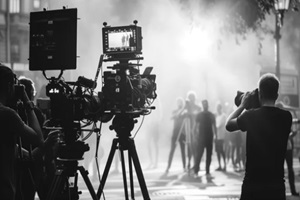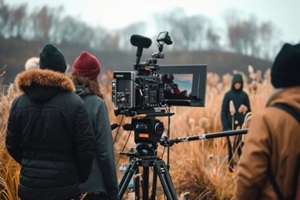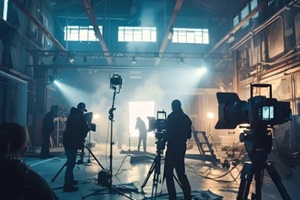 As with any production studio, documentary filmmakers are susceptible to financial loss when things go wrong during filming or distribution—and with so many moving parts involved in a film, hazards are a when, not an if.
As with any production studio, documentary filmmakers are susceptible to financial loss when things go wrong during filming or distribution—and with so many moving parts involved in a film, hazards are a when, not an if.
To make sure your production is protected against the perils most likely to do it harm, maintaining a broad spectrum of insurance for documentary production is non-negotiable.
However, there are dozens of possible policy types to choose from, and selecting all of them without consideration of how they fit into your project is simply a waste of financial resources.
Here are the top insurance policies for documentary filmmakers and an overview of which areas of production they cover.
General Liability Insurance
Of all possible insurance policies, general liability insurance can be considered the most important overall because most documentaries cannot even start shooting without it. Venues, shooting locations, and more will typically not allow your team to reserve a spot without proof of basic general liability coverage.
This type of insurance protects a documentary team from financial and legal repercussions should their activities injure a third party or if filming causes physical damage to someone’s property.
General liability insurance is essential, especially for documentaries, which are often filmed in public with many unrelated strangers in the area. Whether someone trips over a camera cable and needs medical attention or a scrim tips over and dents someone’s car, general liability insurance has you covered.
Errors & Omissions Insurance
Documentaries are the type of film production most likely to benefit from E&O insurance because they involve real people rather than fictional individuals. Errors and omissions insurance covers mistakes, such as accidental copyright infringement, invasion of privacy, plagiarism, libel, slander, and more.
Any documentary can benefit from E&O insurance. However, suppose you are working with a distributor. In that case, you are often required to carry a level of E&O coverage that aligns with their minimum standards.
Equipment Insurance
 Similar to all films, documentaries require complex equipment such as lighting, sound equipment, cameras, and more. If this equipment becomes damaged or needs to be replaced, it can represent a substantial cost for the production studio and delay the shoot schedule.
Similar to all films, documentaries require complex equipment such as lighting, sound equipment, cameras, and more. If this equipment becomes damaged or needs to be replaced, it can represent a substantial cost for the production studio and delay the shoot schedule.
Equipment insurance can pay for equipment repairs or replacement of the tool, either with its current cash value or with an equivalent machine, depending on the verbiage in the insurance policy.
Those filming using rented or non-owned equipment would do well to add Continuing Rental or Loss of Use protection, either as a separate policy or rider.
This coverage can reimburse the equipment owner for damage to their property or the loss of income they experience if your team damages their filming tools. They cannot rent them out until they are repaired.
Business Interruption Insurance
Even if everyone on set is careful, accidents happen—and accidents such as destroying a camera can cause costly damage and delay or even completely halt the production schedule.
Whether your documentary has encountered a delay due to equipment malfunction or your venue canceled on you, falling behind on the production schedule can have financial implications.
Business interruption insurance covers your studio while production is halted. From rental payments due while you are in a holding pattern to extra fees caused by shifting the timeline, this coverage helps keep your finances aligned when the timetable needs to be reimagined.
Workers’ Compensation Insurance
Unlike many types of film productions, documentaries do not typically have “stars”—that is, famous people in the lead roles. Thus, many documentary teams do not choose to purchase cast insurance to cover their talent.
 However, it is still wise (and in many locations necessary) to purchase a workers’ compensation insurance policy. This type of insurance covers the crew on your film if they are injured or even killed during filming.
However, it is still wise (and in many locations necessary) to purchase a workers’ compensation insurance policy. This type of insurance covers the crew on your film if they are injured or even killed during filming.
For instance, if a lighting team member falls from a rig and breaks their back, workers’ compensation insurance will pay for their medical bills and the cost of physical rehabilitation, time off from work, and even liability claims. If the employee dies from their injuries, workers’ compensation can pay the family for their loss.
Cover Your Insurance Bases With MFE Insurance
Producing a documentary is a complex process, and worrying about insurance coverage can add stress to an already stressful project. The experts at MFE Insurance can simplify the insurance aspects of your documentary production, from an accessible online portal to thorough guidance based on years of experience, specifically in the film industry.
Contact MFE Insurance for customized insurance coverage that addresses the special risks faced by your documentary team.
